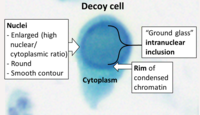
Photo from wikipedia
Trichodysplasia spinulosa (TS) is a rare skin condition that occurs mainly in immunosuppressed patients. Although initially postulated to be an adverse effect of immunosuppressants, TS-associated polyomavirus (TSPyV) has since been… Click to show full abstract
Trichodysplasia spinulosa (TS) is a rare skin condition that occurs mainly in immunosuppressed patients. Although initially postulated to be an adverse effect of immunosuppressants, TS-associated polyomavirus (TSPyV) has since been isolated from TS lesions and is now considered to be the causative agent. Trichodysplasia spinulosa presents with folliculocentric papules with protruding keratin spines, most commonly on the central face. Trichodysplasia spinulosa can be diagnosed clinically, but the diagnosis can be confirmed with histopathological examination. Histological findings include the presence of hyperproliferating inner root sheath cells containing large eosinophilic trichohyaline granules. Polymerase chain reaction (PCR) can also be used to detect and quantify TSPyV viral load. Owing to the paucity of reports in the literature, TS is frequently misdiagnosed and there is no high-quality evidence to guide management. Herein, we present a renal transplant recipient with TS that did not respond to topical imiquimod but improved upon treatment with valganciclovir and reduction of the mycophenolate mofetil dose. Our case highlights the inverse relationship between immune status and disease progression in this condition.
Journal Title: Dermatology online journal
Year Published: 2022
Link to full text (if available)
Share on Social Media: Sign Up to like & get
recommendations!